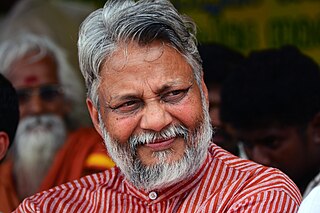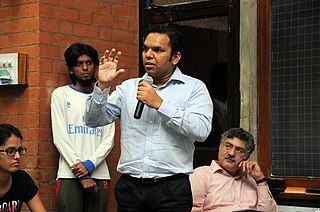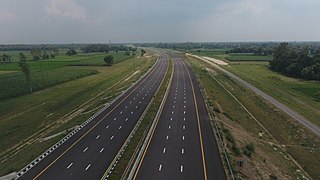Amla Ruia | |
|---|---|
 Ruia in 2010 | |
| Nationality | Indian |
| Occupation(s) | Entrepreneur, Water Activist and Educationist |
Amla Ashok Ruia is an Indian environmentalist known for her work in water harvesting.
Amla Ruia | |
|---|---|
 Ruia in 2010 | |
| Nationality | Indian |
| Occupation(s) | Entrepreneur, Water Activist and Educationist |
Amla Ashok Ruia is an Indian environmentalist known for her work in water harvesting.
Ruia was inspired by severe droughts in 1999/2000 and 2003 to improve water harvesting in Rajasthan villages. [1] [2] She founded the Aakar Charitable Trust(ACT) to partner with villages to build check dams that provide water security. [3]
Her first check dam project was in Mandawar village, [1] Rajasthan, which was a success. Farmers managed to earn up to 120 million rupees in a year via the two check dams built by Aakar Charitable Trust. [1] By the end of 2017, Aakar Charitable Trust had built more than 200 check dams in more than 115 villages in Rajasthan, with flow-on effects to almost 200 other villages. [4] [5] [6] The Trust provides 60-70% of the resources required to construct each check dam, while the village where the dam is sited provides 30-40% of resources, participates in its construction, and is responsible for its maintenance. [3] [4] The check dams allow the aquifers to be replenished during the monsoon, so that bore wells and hand-pumps are recharged. [4] Villagers have been able to grow up to three crops per year and keep livestock. [1] [3] [4] Ruia estimates that the resulting increased income gives a 750% return on the investment in the check dams. [3] |Girls are able to attend school, as they no longer need to help their mothers carry water from long distances, [4] and students can undertake tertiary education. [3] Ruia is popularly known as Paani Mata ("Water Mother"). [1] [7]
Ruia and her team have extended their efforts in other states such as Madhya Pradesh, [1] [5] Maharashtra, [1] [5] Odisha, [5] and the Dantewada district in Chhattisgarh, [1] [5] and have plans to expand into Bihar, [2] Haryana, [2] Uttaranchal and Uttar Pradesh.
In 2011, Ruia was awarded a Lakshmipat Singhania - IIM Lucknow National Leadership Award in the category of Community Service and Social Upliftment. [8] [9] In 2016, she was nominated for the Women of Worth Social Award category. [6] In 2018, she received the India Eye International Human Rights Observer Achievement Award 2018. [10]
Amla Ruia was born in Uttar Pradesh. [11] She currently lives in Malabar Hill, Mumbai, Maharashtra. [12]

Uttar Pradesh is a state in northern India. With over 241 million inhabitants, it is the most populated state in India as well as the most populous country subdivision in the world – more populous than all but four other countries outside of India – and accounting for 16.5 percent of the population of India or around 3 percent of the total world population. The state is bordered by Rajasthan to the west, Haryana, Himachal Pradesh and Delhi to the northwest, Uttarakhand and Nepal to the north, Bihar to the east, Madhya Pradesh, Chhattisgarh and Jharkhand to the south. It is the fourth-largest Indian state by area covering 243,286 km2 (93,933 sq mi), accounting for 7.3 percent of the total area of India. Lucknow serves as the state capital, with Prayagraj being the judicial capital. It is divided into 18 divisions and 75 districts. On 9 November 2000, a new state, Uttaranchal, was created from Uttar Pradesh's western Himalayan hill region. The two major rivers of the state, the Ganges and its tributary Yamuna, meet at the Triveni Sangam in Prayagraj, a Hindu pilgrimage site. Other notable rivers are Gomti and Saryu. The forest cover in the state is 6.1 percent of the state's geographical area. The cultivable area is 82 percent of the total geographical area, and the net area sown is 68.5 percent of the cultivable area.

Kanpur ( ), formerly anglicized as Cawnpore, is the second largest city of the Indian state of Uttar Pradesh. It was the primary financial and commercial centre of Northern India. Founded in the year 1207 by a Rajput ruler Raja Kanh Deo, Kanpur became one of the most important commercial and military stations of British India. Kanpur is often regarded as the heart of Uttar Pradesh. Kanpur has been the major financial and industrial centre of North India and also the ninth-largest urban economy in India. Today it is famous for its colonial architecture, gardens, sweets, dialect, IT parks and fine quality leather, plastic and textile products which are exported mainly to the West. Kanpur is also the financial capital of Uttar Pradesh.

Indian Institute of Management Lucknow is a public business school in Lucknow, Uttar Pradesh, India. It was established in 1984 as the fourth Indian Institute of Management (IIM) by the Government of India. IIM Lucknow offers post-graduate diploma, fellowship and executive programs in management. It is recognised as an "Institution of Excellence" by India's Ministry of Human Resource Development. IIM Lucknow serves as the mentor institution for the newly established IIM Jammu, IIM Rohtak and IIM Kashipur. It also served as a mentor institute to IIM Sirmaur till 2018.
Churu is a city in the desert region of Rajasthan state of India. It is known as the gateway to the Thar Desert of Rajasthan. It is the administrative headquarter of Churu District. It lies in the Thar Desert on the National Highway 52 connecting Sangrur to Ankola and is a junction station on the railway line to Bikaner. It is near the shifting sand dunes of the Thar Desert and has grand havelis with marvelous fresco paintings, namely Kanhaiya Lal Bagla Ki Haweli and Surana Haweli, with hundreds of small windows. It also has some fine Chhatris. Near the town is a religious seat of the Nath sect of Sadhus where there are life-size marble statues of their deities and a place for prayers. At the center of the town is a fort built about 500 years ago.

Rajendra Singh is an Indian water conservationist and environmentalist from Alwar district, Rajasthan in India. Also known as "waterman of India", he won the Magsaysay Award in 2001 and Stockholm Water Prize in 2015. He runs an NGO called 'Tarun Bharat Sangh' (TBS), which was founded in 1975. The NGO based in village hori-Bhikampura in Thanagazi tehsil, near Sariska Tiger Reserve, has been instrumental in fighting the slow bureaucracy, mining lobby and has helped villagers take charge of water management in their semi-arid area as it lies close to Thar Desert, through the use of johad, rainwater storage tanks, check dams and other time-tested as well as path-breaking techniques. Starting from a single village in 1985, over the years TBS helped build over 8,600 johads and other water conservation structures to collect rainwater for the dry seasons, has brought water back to over 1,000 villages and revived five rivers in Rajasthan, Arvari, Ruparel, Sarsa, Bhagani and Jahajwali. He is one of the members of the National Ganga River Basin Authority (NGRBA) which was set up in 2009, by the Government of India as an empowered planning, financing, monitoring and coordinating authority for the Ganges (Ganga), in exercise of the powers conferred under the Environment (Protection) Act, 1986.
Raghuvir Singh Meena is an Indian National Congress leader and member of Congress Working Committee (CWC), the highest decision-making body of the Indian National Congress.

A johad, also known as a pokhar or a percolation pond, is a community-owned traditional harvested rainwater storage wetland principally used for effectively harnessing water resources in the states of Haryana, Rajasthan, Punjab, and western Uttar Pradesh of North India, that collects and stores water throughout the year, to be used for the purpose of recharging the groundwater in the nearby water wells, washing, bathing and drinking by humans and cattle. Some johads also have bricked or stones masonry and cemented ghat.

Vineet Nayar is an Indian business executive, author and philanthropist. He is the former chief executive officer of HCL Technologies (2007–13), Founder Chairman & CEO of Sampark Foundation and author of a critically acclaimed management book "Employees First, Customers Second: Turning Conventional Management Upside Down”. which has sold 100,000+ copies.

Tulasi Munda is a social activist from the Indian state of Odisha. She was awarded the Padma Shri in 2001 by Government of India for her contribution to spreading literacy among the impoverished adivasi peoples of Odisha. Munda started an informal school in 1964 in Odisha's iron ore mining area to educate children from local adivasi populations, who would otherwise have ended up as child labour in the mines. She had been a child labourer in the mines of Keonjhar herself.

Gajendra Pal Singh Raghava is an Indian bio-informatician and head of computational biology at the Indraprastha Institute of Information Technology.

Ambedkar Memorial Park, formally known as Dr. Bhimrao Ambedkar Samajik Parivartan Prateek Sthal, is a public park and memorial in Gomti Nagar, Lucknow, Uttar Pradesh, India. The memorial is dedicated to B. R. Ambedkar, the 20th century Indian polymath and the first law minister of India.
Amit Prakash Sharma is an Indian parasitologist and Former Director of National Institute of Malaria Research, New Delhi. He is known for his studies on the disease of malaria and is an elected fellow of the Indian Academy of Sciences, Indian National Science Academy, The World Academy of Sciences and the National Academy of Sciences, India. He has been awarded the Shanti Swarup Bhatnagar Award in Biological Sciences, JC Bose Fellowship, Ranbaxy Science Research Award, Infosys Science Award in Biological Sciences, Om Prakash Bhasin Award in Biological Sciences and Lakshmipat Singhania- IIM Lucknow National Leadership Award.
Hari Shankar Singhania was the President of J.K. Organisation, a leading Indian industrial group, which has its roots extending nearly 100 years, and is one of the largest industrial groups in India. It has multi-business, multi-product and multi-location operations. Most of the companies in the group are public limited entities, with more than 40,000 employees. The group has more than 500,000 shareholders, with a nationwide sales and service network of over 10,000 distributors and many retailers and service centres. The group has export interests in nearly 90 countries across the globe.

Mallika Srinivasan is an Indian industrialist and is the chairman and managing director of Tractors and Farm Equipment Limited, a tractor major incorporated in 1960 at Chennai, India. She served as Chairperson of the Public Enterprises Selection Board (PESB) constituted by the Government of India from 1 April 2021 and served there till 18 November 2024. She is additionally on the Global Board of U.S.-India Business Council (USIBC), and the Boards of AGCO Corporation - United States. She is a core member of the BRICS Women's Business Alliance and a member of India-US CEO Forum. She is also the member on the Governing Body of Stella Maris College - Chennai.

Srijan Pal Singh is an Indian author, public speaker and social entrepreneur. He was born in Lucknow, Uttar Pradesh.
Uma Tuli is an Indian social worker, educationist and the founder of Amar Jyoti Charitable Trust, a Delhi-based non-governmental organisation, working for the rehabilitation of physically disabled people. She was honoured by the Government of India, in 2012, with the fourth highest Indian civilian award of Padma Shri.

Purvanchal Expressway is a 340.8 km long, 6-lane wide access-controlled expressway in the state of Uttar Pradesh, India. The expressway connects Chand Saray village near Gosainganj in Lucknow district with Haydaria village on NH-31 in Ghazipur district. It is developed by the Uttar Pradesh Expressways Industrial Development Authority (UPEIDA). The Purvanchal Expressway has a 3.2 km long airstrip at Akhalkiri Karwat village near Kurebhar in Sultanpur district for emergency landing of aircraft. The construction work was started by the UPEIDA on 10 October 2018 and was inaugurated and opened to the public on 16 November 2021.
S M Sehgal Foundation is an Indian NGO focused on rural development with its head office in Gurugram, Haryana. It was founded as an Indian public, charitable trust in 1999 by plant geneticist Suri Sehgal and his wife Mrs. Edda Sehgal, who together had accumulated wealth through the 1998 sale of their hybrid seed businesses, Proagro Group.

Lala Kamlapat Singhania was an Indian industrialist, who founded the J. K. Organisation, one of India's largest conglomerate companies. He was born to a Marwari Bania family in Kanpur, then part of the North-Western Provinces in British Raj. He was the founder of several companies which came under the umbrella of JK Organization. The first major business set up by him was a cotton mill with the name of Juggilal Kamlapat Cotton Spinning & Weaving Mills in 1921 which laid the foundation for JK Organisation.
The Singhania family is a prominent Indian business family, that started out in the Indian city of Kanpur. The family expanded into three major branches and is currently based out of Kanpur, Mumbai and Delhi. JK Organisation founded by Lala Kamlapat Singhania is one of the largest conglomerates in India today, with multiple million and billion dollar companies under its belt. The family owns majority stakes in several publicly listed companies such as JK Tyre, JK Cement, JK Lakshmi Cement, JK Paper, Jaykay Enterprises, JK Agri Genetics and JK Dairy. Some privately held companies in the family are Raymond Group, J.K. Ansell, JK Tech, JK Fenner, JK Insurance brokers and Global Strategic Technologies.